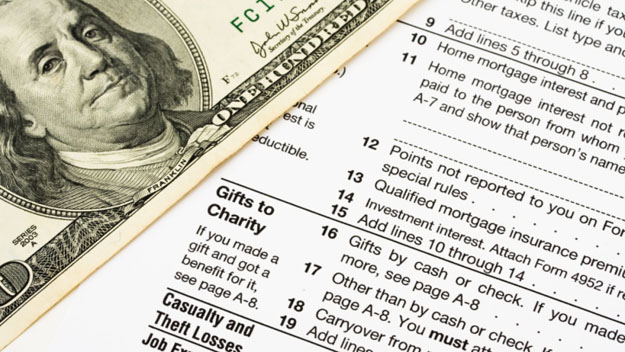Tax Tips: What You Need to Know About Write Offs And Donations

Knowing what you can legitimately deduct off your taxes and what receipts you didn’t need to hold on to after all, can help both you and your accountant avoid a lot of headaches. Wondering which is which? Brooklyn College professor and certified public account, Michael Goldfine, provides tax write-off dos and don’ts.
Receipt-Keeping 101
“Of course you know you have to keep receipts,” says Goldfine. This simplistic rule of thumb is non-negotiable, particularly if you have more legitimate deductions than is typical within your profession. “The IRS keeps extensive records on tax deduction averages, based on specific algorithms and their own infinite research on tax returns they have received. If your deductions far exceed your industry’s average, you may automatically trigger an audit,” he explains. As uncomfortable as the thought of an audit might be, if you have receipts to back up your deductions, there’s nothing to worry about.
No matter how spanking clean your records, none of your receipt keeping will matter if your total deductions do not exceed the two percent rule. “For individuals, the government has all but wiped out the ability to deduct anything. For those individuals itemizing their returns, you must show that you have write-offs in excess of two percent of your AGI (adjusted gross income)," he adds. For this reason, it is important not to overlook any potential deductions at all and it always makes sense to check with an accountant who knows their stuff.
Related: Tax Tips and Information
Common Write-Off Checklist
“One deduction that’s forgotten about all the time is the fee you paid your account to do your last tax return,” says Goldfine. Other write-offs on Goldfine’s don’t-forget list include:
- Safety deposit box rental fees
- Investment fees
- Moving expenses, provided the move was work-related and at least 50 miles away from your original place of residence or work space
- A portion of your pension plan and health insurance if you are self-employed
- Student loans
- Alimony (but not child support)
Shell-shocked parents, astonished by the costs associated with raising children, can typically deduct tuition fees and other expenses associated with school such as books and supplies. Expensive as they may be, school uniforms and the cost of day-to-day clothing is not deductible. “A portion of your child’s day camp, but not sleep away camp may nab you a tax credit under certain circumstances,” adds Goldfine.
“A write-off for school teachers is the first $250 of classroom expenses, like books and pencils, not reimbursed from the school,” he adds.
Un-reimbursed employee expenses for all types of workers can include things like dues and professional memberships, travel expenses and research materials.
Renters lose at tax time, although some states do provide a tax credit for a nominal amount. Home owners shouldn’t forget write-offs and tax credits associated with home improvement, like going solar, points paid on home loans or their mortgage interest.
Car Donations
Donating your car to charity will provide you with a write-off. How hefty the deduction will be depends upon several criteria, however. “The charity that receives the car usually provides a form which would include the VIN (vehicle identification number) giving the year of manufacture and current fair market value, along with other considerations,” says Goldfine.
Charitable Contributions
Goldfine suggests digging deep when it comes to giving to charity. “Find causes you believe in and give. Things like races, galas and auctions can all represent write-offs. Use your credit card when making donations and choose your charities wisely,” he says. “People often forget about the expenses they incur when volunteering their time. You can’t write-off the value of the time you spend at say, a soup kitchen, but you can potentially deduct the travel costs associated with getting there and back,” he adds.
For more tax tips listen in to Shep Hyken interview Lisa Greene-Lewis on tax tips that will save you money:
Corey Whelan is a freelance writer in New York. Her work can be found at Examiner.com.



